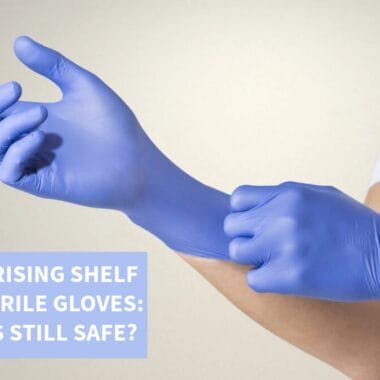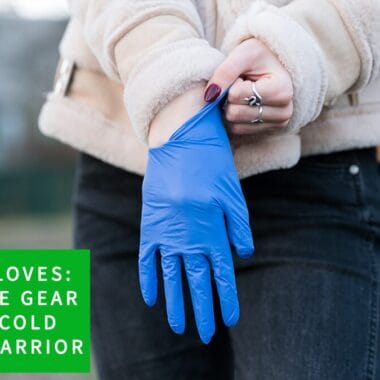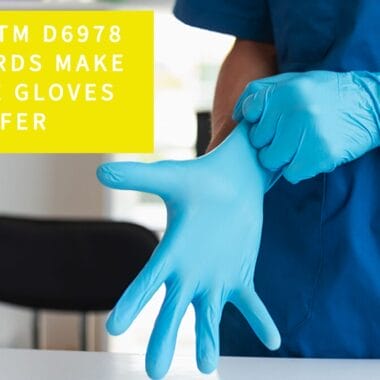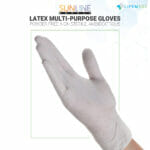In the 19th century, surgeries on average has a 50% death rate due to the fact that doctors did not use surgical gloves and sometimes did not even wash their hands. Sanitation has come a long way since then and now we have all sorts of ways to keep harmful bacteria at bay, most importantly with nitrile gloves. But some people have allergies to nitrile.
This is a big problem if you need to use nitrile medical gloves as part of your career. So, how can you know if you have a nitrile glove allergy, what are the symptoms, and is there anything you can do to prevent this problem? Keep reading and learn more about this unique allergy below.
What You Need to Know About Allergies to Nitrile Gloves
Many people use nitrile gloves instead of rubber latex gloves because many people are allergic to latex. However, there is a small percentage of people who are also allergic to nitrile.
Even though nitrile is a completely synthetic type of rubber and does not contain any natural latex, it may still irritate the skin of certain people.
This is because there are certain chemicals in nitrile that tend to be irritating to the skin such as thiurams and dithiocarbamates. This is especially true if you happen to have sensitive skin. In general, it is very rare for people to have a true allergic reaction to nitrile.
More commonly, some people may experience skin irritation as a result of wearing nitrile exam gloves for an extended period of time. However, just because your skin becomes irritated after wearing nitrile gloves doesn’t necessarily mean that you have an allergy to nitrile.
Rather, your skin might just be sensitive to the chemicals in the nitrile gloves. This is not a serious problem, but it may be irritating, especially if you have to wear these gloves for hours at a time. Some people may develop contact dermatitis when wearing nitrile gloves.
Contact dermatitis is not a serious condition, but it can cause irritation to your skin. Contact dermatitis may be mild or it may be more severe, depending on the sensitivity of your skin and how it reacts to nitrile, or specifically the chemicals in nitrile. Unfortunately, it is not possible to get nitrile gloves without these chemicals.
This is because these chemicals are necessary to create synthetic rubber. Without them, nitrile would not be able to exist. Unfortunately, they can cause a variety of symptoms in those with sensitive skin.
What You Need to Know
For example, some people may develop hives after wearing nitrile gloves for too long. Hives are small red bumps that appear at the site of inflammation. They are often itchy, painful, or feel warm to the touch.
Another symptom involves rashes. Rashes do not involve raised bumps but they may be red or even scaly. In some cases, a rash can even cause your hands to swell up or feel warm or itchy.
Yet another symptom of nitrile sensitivity or allergy involves cracking skin. This usually only occurs if the previous symptoms are ignored and continue to get worse. Cracked skin tends to occur around folds of skin and near joints such as the fingers.
It may also occur on the back of the knuckles or on your fingertips. Cracked skin is quite a serious symptom since it can cause bleeding and increases your risk of infection. This is not to mention that cracked skin is quite painful and can make it difficult to move your hands.
But what can you do to combat these irritating symptoms?
What To Do About a Nitrile Glove Allergy
Just because nitrile gloves irritate your skin doesn’t mean that you can’t wear nitrile gloves ever again. There are certain things you can do to keep your skin from flaring up. For example, suppose you only experience mild symptoms of irritation when wearing these gloves such as a rash.
If you start to notice your skin getting irritated, take off the gloves and wash your hands with soap and water. This will remove the nitrile chemicals from the surface of your skin. That way, when you put on a pair of nitrile gloves afterward, the symptoms of irritation should not affect you for some time.
Of course, this is not a cure for the problem. Eventually, after wearing the gloves for some time, the irritation will come back. If you find that the irritation is getting worse despite washing your hands, you should switch to vinyl gloves in the meantime.
That way, you can give your skin a chance to rest. Another remedy is to limit the amount of time you wear nitrile gloves. If you only wear the gloves for short periods of time, your skin shouldn’t have the chance to get too irritated from the nitrile chemicals.
Hydrocortisone cream is important for treating more severe allergic reactions to these gloves. The cream will soothe any rashes or hives you happen to have. As long as you limit the time you wear nitrile gloves, wash your hands frequently, and use hydrocortisone cream when necessary, you shouldn’t have to deal with any skin irritation in the future.
Allergies and Nitrile Gloves
Allergies to nitrile gloves are not common, but they can happen. At the very least, your skin might be particularly sensitive to nitrile. If this happens, don’t worry, because there are several solutions you can try.
If you find that you are developing hives or rashes as a result of the gloves, try switching to vinyl gloves for a while. If you need to wear nitrile gloves, try to avoid wearing them for long periods of time.



















Comments are closed.